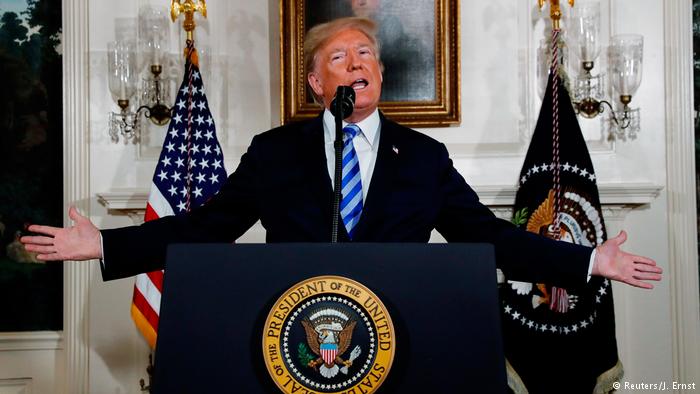IN THE MEDIA
Trump’s Iran nuclear decision offers hope for a better deal
May 13, 2018 | Colin Rubenstein

The Age/Sydney Morning Herald – 12 May 2018 – 11:00pm
US President Donald Trump had been threatening since before his election to withdraw the US from the nuclear deal with Iran, known as the Joint Comprehensive Plan of Action (JCPOA), and reimpose nuclear sanctions on Iran. On May 8, he announced that the US was indeed doing so.
Now the hope must be that Trump’s announcement signals the beginning of a new era of negotiations and sustained diplomatic efforts to put into place new and better arrangements to thwart Iran’s dangerous nuclear ambitions and regional aggression.
In announcing his decision, Trump rightly pointed out that: “The deal lifted crippling economic sanctions on Iran in exchange for very weak limits on the regime’s nuclear activity, and no limits at all on its other malign behaviour, including its sinister activities in Syria, Yemen, and other places all around the world.”
There is no doubt that the JCPOA is deeply flawed in four ways.
Firstly, despite declarations from the International Atomic Energy Agency (IAEA) that Iran was upholding its end of the bargain, the inspection regime itself has been wholly inadequate. Inspectors were not given unrestricted access by the regime and have been kept away from Iranian military sites – which is where military weaponisation work would likely take place.
Second, the deal failed to address Iran’s ongoing ballistic missile research and testing. These ballistic missiles, once perfected, are the delivery system – a key component of any nuclear weapons program.
Third, in removing the crippling sanctions previously on Iran, the JCPOA helped fuel the regime’s increasing support for terrorism, efforts to destabilise its neighbours and involvement in bloody proxy wars.
Following the lifting of sanctions in 2015, more than $US100 billion ($132 billion) flowed into Iranian coffers. However, instead of using this freed-up wealth to support its citizens, the Iranian regime – egged on by the fanatical Islamic Revolutionary Guards Corps which increasingly controls much of Iran’s economy and politics – has expanded its supplies of funding and weaponry to support terrorist activities and rogue groups in Lebanon, Yemen, Syria, Gaza and across the Middle East.
Finally and most importantly, the JCPOA merely delayed but does not in any way, shape or form dismantle Iran’s nuclear program.
The highly flawed deal has allowed Iran to continue working on advanced centrifuges which will allow it to enrich uranium very quickly once the JCPOA’s “sunset clauses” begin expiring after 2025. The result: a nuclear weapons breakout can then happen whenever Teheran wishes, with little chance nuclear inspectors or international intelligence would detect this before it was too late – as even the JCPOA’s architect, Barack Obama, conceded in 2016.
Israeli President Benjamin Netanyahu confirmed Iran’s duplicitous behaviour in his recent media presentation of captured Iranian nuclear archives.
Israel’s intelligence cache revealed that Iran had lied to nuclear inspectors about its weapons development and had hidden its nuclear files – a direct breach of the conditions of the JCPOA.
So while Iran may be adhering to the terms of the JCPOA in terms of limiting the number of centrifuges it is running and the amount of uranium it is enriching, this is because it does not need to violate these terms of the deal to achieve its aims. The nuclear archive makes it clear that Iran had retained plans for bomb designs, records of work it has done fashioning nuclear cores for bombs, as well as plans to miniaturise its bombs and place them in warheads on its missiles. All it needs now is enough enriched uranium for its arsenal – and the terms of the JCPOA effectively allow Iran to get this quickly, using highly advanced centrifuges, after 2025.
In his remarks at the White House on Tuesday, Trump expressed quite clearly that US withdrawal from the JCPOA should by no means be construed as an invitation for military confrontation or escalation with Iran.
All interested parties, including the Australian government, now have the chance to support the diplomatic hard work needed to put in place new and more comprehensive arrangements with stricter, more easily verifiable compliance conditions.
As a starting point, the JCPOA sunset clauses that allow the regime to continue nuclear development must be axed. IAEA inspectors must also be given unlimited access to Iran’s declared and suspected nuclear sites, including especially those run by the military.
A new deal must prohibit Iran’s continued development of long- and short-range ballistic missiles.
Finally, the ongoing concerns about Iran’s behaviour in the region must be addressed. Iran’s proxies include proscribed terrorist groups Hezbollah and Hamas, barbaric Syrian President Bashar al-Assad and the brutal Houthi rebels in Yemen. And the regime is becoming increasingly brazen in its aggression against neighbours – firing 20 missiles into Israel from Syria on Wednesday night.
Trump’s decision clearly opens a difficult, unpredictable and complex road ahead if the world is to forge new arrangements that will genuinely end the Iranian nuclear threat, and constrain Iran’s other destablising behaviours. Yet this road appears preferable to the road the world was on under the JCPOA – which was not only a direct path to a nuclear Iran in a few years time, but one which was actually fuelling Iranian terrorism, efforts to overthrow neighbour governments, and bloody proxy wars in both Syria and Yemen.
Dr Colin Rubenstein is executive director of the Australia/Israel & Jewish Affairs Council. Previously, he taught Middle East politics at Monash University for many years.
Tags: International Security





